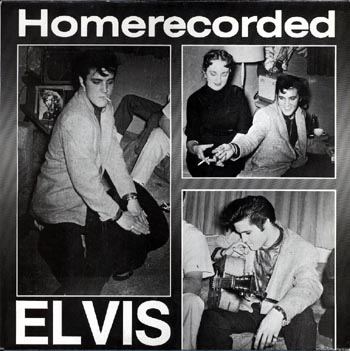

“ Homerecorded Elvis ” on the TO 300 label contains
the summer 1958 Eddie Fadal home recording. This material was first released on the LP “Forever Young
and Beautiful” circa 1978 on the Memphis Flash JL-92447 label.
The “ Homerecorded ” LP has no date, and the only reference to a
label is on the upper right back corner of the LP sleeve.
Given that Cotten and DeWitt do not list it in their “Jailhouse Rock
” book, it was probably released after 1983.
I have two variations of the “ Homerecorded Elvis ”
LP. The one is pressed on black
vinyl, the other on white/red/blue splash vinyl. Interestingly, direct comparison of the matrix numbers reveals that
both versions are from the same pressing ( or at least the same stamps though
possibly at different times ) as the form of the matrix number texts are exactly
the same on both sides A and B. Also,
the LP covers are exactly the same; with the exception of a gold stick with
black text on the once cover promoting the “ Limited Edition Coloured Vinyl
”. The black and white cover
features three photos of Elvis apparently hanging out with friends at
someone’s house, though the photos are pre-Army induction as Elvis still has
his long hair. The back cover has a black
and white photo of Elvis looking surprised at being embraced from behind by a
female who looks like a young Natalie Wood.
The LP labels are text less and have the same black and
white circa 1956-57 photo. The Elvis
Import Vinyl web page notes a version pressed on red vinyl.
The material was released on CD in 1992 under the title “ Home Made Recordings
” on the TCB Records TCBR CD 58789. If
my memory serves me correctly, the CD version was copied from the LP. In comparison, the black vinyl pressing has a slight amount of
surface noise; while the splash vinyl pressing has virtually no surface noise,
which is odd considering most colored vinyl versions are inferior to a black
vinyl pressing counterpart. The black
vinyl version is a thinner pressing than the colored vinyl version. The original
source tape has some distortion in places where the performances are loud.
The “ Forever Young and Beautiful ” LP is master at a lower volume
and it a bit quieter.
Side A contains the most interesting material as far as
I am concerned. After some dialogue,
Elvis plays piano and sings “ I Understand Just How You Feel ”, complete
with one of the Fadal children crying in the background; one or more of the
children can be heard throughout most of the LP crying in the background.
This selection is the only officially released track from these informal
recordings as it appeared in 1999 on BMG’s “ The Home Recordings ” CD.
Elvis goes into a version of The Tune Weavers’ song “ Happy Birthday
Baby ”. Then Elvis coaxes his then
girlfriend Anita Wood to sing “ I Can’t Help It ”, and after finding a
comfortable key for her to sing in, she gives the highlight performance of the
LP in my opinion, with Elvis providing background vocals. Then comes and interesting discussion as apparently Anita had
signed a recording deal and was about to record her first record.
Elvis is worried that the songs she will be given will be “ a little
too pop-lar ”. I am not sure how many
records Anita recorded, but I have one 45 RPM: SUN 361 “ I’ll Wait Forever
” and “ I Can’t Show How I Feel ” which probably met Elvis’ worst
fears as the recordings are very pop oriented with string overdubs and doubled
vocal parts. It is no criticism of
Anita’s vocal abilities because she can sing beautifully, and I would like to
hear any other songs she had the chance to record in hopes that she was given
quality material and production on at least a few songs.
Back to the LP, Elvis continues on accompanying Anita
twice in a row on the Connie Francis song “ Who’s Sorry Now? ”
To finish off side A, Elvis does vocal accompaniment singing to the
record version of “ Happy Birthday Baby ”. Side
B opens with vocal accompaniment six more times with The Tune Weavers record
version of “ Happy Birthday Baby ”. “
Tumbling Tunbleweeds ” is an excerpt that leads into vocal accompaniment with
Fats Domino’s 1955 record “ Baby Don’t Ya Know ”.
The vocal accompaniment extravaganza continues with Elvis doing bass
thumps and falsetto parts to LaVerne Bakers’ “ Tomorrow Night ” and the
Diamond’s “ Little Darling ”. The
record closes out with Elvis back at the piano leading a sing-a-long of the
gospel song “ Just A Closer Walk With Thee ”…conmplete with a Fadal child
crying through the entire performance.
Ernie Boyes Jr.